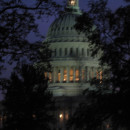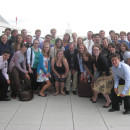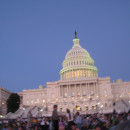Studying American Politics at the Heart of It All: Washington Semester Program Past Review
By Elena G (HISTORY., Trinity University) for
American University: Washington D.C - Washington Semester Program
I learned a lot about myself- like that I can actually survive and even thrive in a 9-6 office environment. I learned useful life skills, like how to hold a political dialogue, and even how to navigate public transport. Perhaps most importantly, I have confirmed that I really do love politics and policy, and I have caught Potomac Fever. I am now moving to DC after I graduate from Trinity, either for graduate school, to work at my internship (for pay, this time), or to get a job in politics. I gained stellar recommendations from professors and my internship, and learned how the town works.
Review Photos



Review Your Program
|
* Overall educational experience
Academic rigor, intensity, resources, etc. |
This is an American university (literally American University), so it has relatively similar grading systems. Obviously, every professor is a little different, so he allows for a bit of a learning curve on the first assignment, so you can learn what he wants in a paper. |
|
* Host Country Program Administration
On-site administration of your program |
My expectations were met and exceeded, and I came in with some pretty high expectations. I never needed much by way of program support, but they made it clear on multiple multiple occasions that it was available to me. Also, you are essentially made a student of American University for the semester, and this allows for full use of the AU campus and facilities. My class was small enough that I knew everyone, though my professor bemoaned several times that it was actually about ten students too large. |
|
* Housing:
How satisfied were you with your living arrangements? |
I opted for WISH Housing- Washington Intern Student Housing. Rather than living in dorms on campus (on the outskirts of DC), you get to live in apartments and townhouses in downtown, mainly on Capitol Hill. I got to live in a single room with a full bed and antique furnishings on the third floor of a gorgeous 19th century townhouse literally two blocks away from the Supreme Court. It means no meal plan, and I think it is a little bit more expensive (though less so if you opt to have a roommate), but it was so very worth it. Once you are in the main area of DC, everything is walkable, and the Metro is very easy to access. It means accepting a longer commute to get to classes held on campus, but more and more as the semester went on we held classes off-campus, in the offices of the people who were lecturing to us. |
| * Food: |
Apparently the on-campus food is pretty weak, but DC as a whole is excellent for food. I cooked for myself. DC has many cheap grocery options like Safeway, plus a Trader Joes and several Whole Foods. My neighborhood also had several local (very overpriced, but convenient) grocers, and of course the multitude of take-out options. Living right next to the Capitol Building, cheap and yummy take-out options abounded! |
|
* Social & Cultural Integration:
How integrated did you feel with the local culture? |
Practically every class was a field trip. We went to Alexandria, VA, and to the Newseum, the Holocaust Museum, and the Supreme Court. Through my internship I got to sit in on an economic briefing at the White House. |
|
* Health Care:
How well were health issues addressed during the program? |
|
| * Safety: |
I lived in a very nice, affluent area, so I had constant police protection and no worries about walking by myself late at night. Everything was very well lit. In other areas, I hear it is quite a different matter. Know where to go. When in doubt, don't, or go in packs. |
| If you could do it all over again would you choose the same program? |
Yes
|
Finances
|
* Money: How easily were you able to live on a student's budget?
(1 = not very easy/$200+ on food & personal expenses/week, 2.5 = $100/week, 5 = very easily/minimal cost) |
|
| Not including program expenses, about how much money did you spend on food and other expenses each week? | I think I probably averaged around $100, but I was shopping almost exclusively at Whole Foods. |
| Do you have any general money-saving tips for future study abroad participants? | The Metro charges more at peak times, so when possible, plan your travel accordingly. General dearth of cheapy options that I could find- i.e. few used bookstores, discount second-run movie theatres, etc. |
Language
| How would you rate your language skills at the beginning of the program? | None |
Other Program Information
|
* Where did you live?
Select all that apply |
|
|
* Who did you live with?
Select all that apply |
|
|
* Who did you take classes with?
Select all that apply |
|
A Look Back
| * What did you like most about the program? |
|
| * What could be improved? |
|
| * What do you know now that you wish you knew before going on this program? | If you are into politics and don't mind living in business casual, you can't intellectually afford to miss this program. I HIGHLY recommend it. I met so many people and gained so many insights. It really helped me to clarify my own political views- now I know why I support issues I support, and I actually learned that upon closer inspection, I change my mind on certain issues. You are expected to be professional and adults, but they also know that you are college kids there to learn. |








